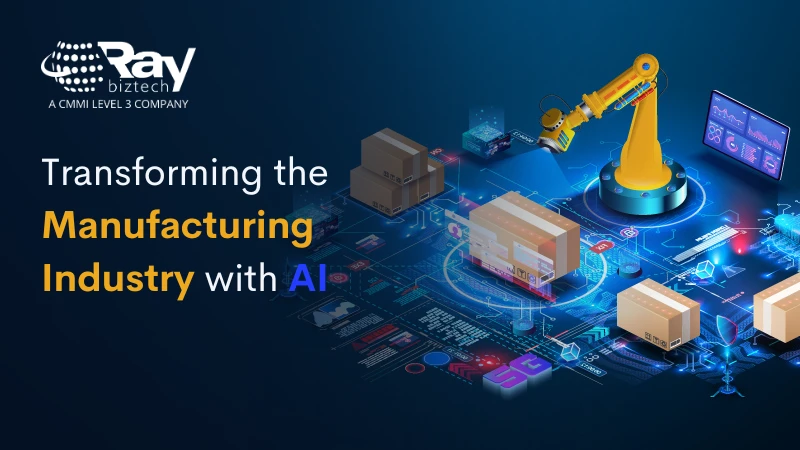Transforming the Manufacturing Industry with AI

The manufacturing industry is undergoing a major shift, driven by technological advancements and the integration of artificial intelligence (AI). As manufacturers are facing issues in therm to optimize operations, reduce costs & improve product quality, AI emerges as a game-changer. This blog explores how AI transforms the manufacturing sector, the key technologies involved, and the benefits of embracing AI-driven solutions.
The Evolution of Manufacturing
Manufacturing has evolved significantly over the past century, from the mechanization of production processes to the introduction of automation and robotics. However, as the demand for customized products and faster production cycles grows, manufacturers must rethink traditional approaches. This is where AI comes into play. By leveraging AI technologies, manufacturers can streamline operations, enhance productivity, and drive innovation.
Key AI Technologies in Manufacturing
Several AI technologies are being adopted in the manufacturing industry, each playing a crucial role in transforming processes:
1. Predictive Maintenance
One of the key applications of AI in manufacturing industry is predictive maintenance. By utilizing machine learning algorithms and data analytics, manufacturers can predict equipment failures before they occur. This visionary approach minimizes downtime, lowers maintenance costs & extends the lifespan of machinery. Sensors installed on equipment collect real-time data, which AI analyzes to identify patterns and anomalies. This allows maintenance teams to address potential issues before they escalate, ensuring smooth operations.
2. Quality Control
AI-powered quality control systems are revolutionizing the way manufacturers ensure product quality. Traditional review methods can be time-consuming & lead to human error. With AI, manufacturers can implement automated visual inspection systems that use computer vision to detect defects in real time. These systems analyze images of products on the production line, identifying inconsistencies and ensuring only high-quality items reach the market.
3. Supply Chain Optimization
By analyzing vast amounts of data, AI can identify trends, forecast demand, and optimize inventory levels. This ensures that manufacturers have the right materials at the right time, reducing excess inventory and associated costs. Additionally, AI can enhance logistics by predicting delivery times, optimizing routes, and improving supplier collaboration. A well-optimized supply chain contributes to overall operational efficiency and cost savings.
4. Robotics and Automation
The integration of AI with robotics has changed manufacturing operations. Intelligent robots can perform complex tasks with precision and speed, making them invaluable in production lines. These robots are trained with AI algorithms that allow them to learn from their environment and adjust to changing conditions. This flexibility allows manufacturers to scale operations quickly and respond to market demands efficiently. Moreover, the use of robots can reduce labor costs and minimize the risk of workplace injuries.
Benefits of AI in Manufacturing
The benefits of integrating AI into manufacturing processes are substantial:
1. Increased Efficiency
AI-driven automation significantly increases operational efficiency. By automating repetitive tasks and optimizing workflows, manufacturers can reduce cycle times and enhance productivity. This leads to faster production rates and a greater capacity to meet customer demands.
2. Cost Reduction
Implementing Artificial Intelligence (AI) solutions can lead to considerable cost savings. Predictive maintenance reduces unplanned downtime, while optimized supply chains lower inventory costs. Additionally, automated quality control processes reduce the costs associated with defective products and recalls.
3. Enhanced Innovation
AI fosters innovation by enabling manufacturers to develop new products and improve existing ones. Data analytics provides insights into customer preferences and market trends, allowing manufacturers to tailor their offerings accordingly. This agility enhances competitiveness and positions businesses as industry leaders.
4. Improved Safety
AI can enhance workplace safety by monitoring conditions and identifying potential hazards. For instance, AI-powered systems can analyze data from wearable devices to assess worker fatigue or stress levels, allowing for timely interventions. By creating a safer working environment, manufacturers can reduce accidents and improve employee morale.
The Future of AI in Manufacturing
As AI technology advances, its impact on the manufacturing industry will only grow. Future innovations may include more sophisticated robotics, enhanced data analytics, and improved human-machine collaboration. Embracing these advancements will be crucial for manufacturers aiming to remain competitive in an increasingly digital landscape.
Conclusion
The integration of AI into the manufacturing industry is not just a trend; it’s a necessity for businesses aiming for sustainable growth and efficiency. By adopting AI technologies, manufacturers can streamline operations, reduce costs, and enhance product quality, ultimately transforming their business models for the future.
At RBT, we provide tailored business growth solutions that harness the power of AI to help manufacturers navigate this transformative landscape. Whether you’re looking to implement predictive maintenance, optimize your supply chain, or enhance quality control, our team is here to support your journey toward a more innovative and efficient manufacturing operation. Contact RBT today to learn how our experts can help you leverage AI for business growth.

